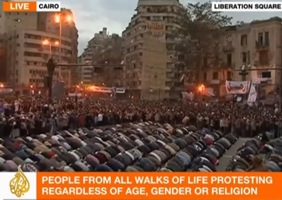Lots has been written about the power of the Internet and tools like Twitter, YouTube and Facebook in the recent promulgation of popular protests across northern Africa and the Middle East.
Latest under the cyber-microscope is Egypt, where a corrupt, decades-old authoritarian regime actually tried to turn off the Internet as protesters began to organize in force over the past couple of weeks.
 On the ground, however, the power still firmly rests in meatspace: those occupying Tahrir (Liberation) Square in Cairo have effectively created a temporary autonomous zone around which the protest has coalesced.
On the ground, however, the power still firmly rests in meatspace: those occupying Tahrir (Liberation) Square in Cairo have effectively created a temporary autonomous zone around which the protest has coalesced.
As the U.S. mainstream media puzzles for “leaders” to emerge, word on Al Jazeera straight from those in the square is that “leaders” aren’t the point of the instant struggle.
How are Egypt’s democratic revolutionaries maintaining (and growing) this wave of dissent? They’ve organized food distribution, medical care, and a clever system of self-security.
The protesters also recently launched a newspaper and pirate radio station.
Twitter, Facebook and the like are great for getting the word out to the world at large, but in fast-moving protest situations, tactical, non-digital media often contribute to the difference between safety and detention, or life and death.
Those of us not in Egypt have an unprecedentedly dynamic and intimate look inside a country in a revolutionary condition, and that’s thanks lots to new media. But the outcome of this revolution won’t be realized on social networks alone – it’s happening right now on broadsheets and over the airwaves, in direct support of those whose bodies are on the line.
The rate of sociopolitical change is accelerated by new digital media tools, but the change itself is still a fully analog phenomenon. I hope that, someday, we’ll learn the story behind this side of Egypt’s media resistance.
Skip to content